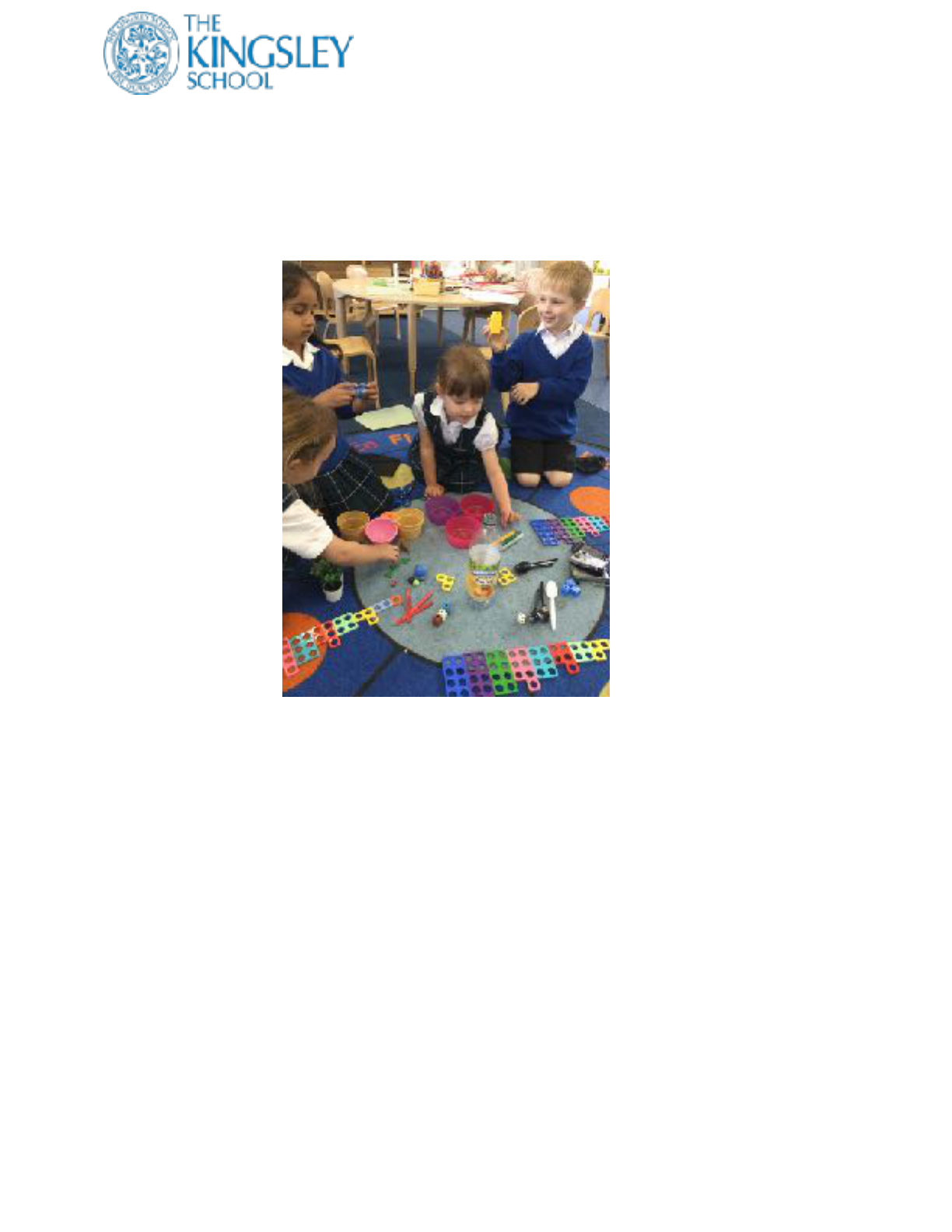
THE KINGSLEY PREP SCHOOL EARLY YEARS FOUNDATION STAGE POLICY
"Children in EYFS make excellent progress, with the overwhelming majority
reaching and often exceeding the expected levels of attainment."
Independent Schools Inspectorate
Introduction
“Every child deserves the best possible start in life and support to fulfil their potential. A
child’s experience in the early years has a major impact on their future life chances. A
secure, safe and happy childhood is important in its own right and it provides the foundation
for children to make the most of their abilities and talents as they grow up.” - Department
for Children, Schools and Families
The Early Years Foundation Stage applies to children from birth to the end of the Reception
year. At The Kingsley Prep School children are admitted to Reception in the September
following their fourth birthday. Early childhood is the foundation on which children build the
Updated November 2022 by J Phillips
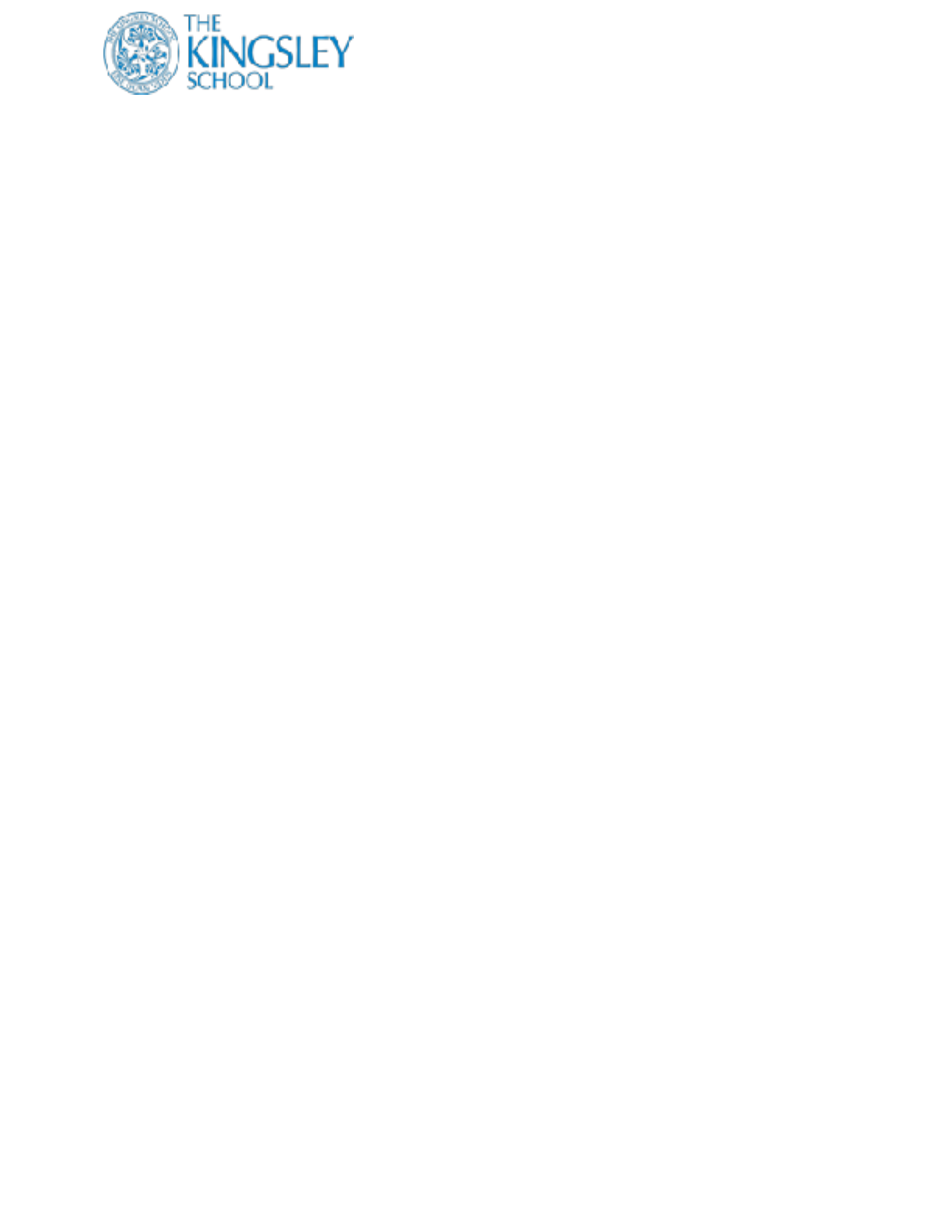
rest of their lives. At The Kingsley Prep School, we greatly value the importance that the EYFS
plays in laying secure foundations for future learning and development. However, we also
believe that early childhood is valid in itself as part of life. It is important to view the EYFS as
preparation for life and not simply preparation for the next stage of education.
Aims
We aim to support all children to become independent and collaborative learners. We will
provide a broad and balanced curriculum that will enable each child to develop personally,
socially, emotionally, spiritually, physically, creatively and intellectually to their full
potential.
At The Kingsley Prep School, we will:
• Provide a happy, safe, stimulating and challenging programme of learning and
development for the children to experience as they begin their journey through school.
• Provide a broad, balanced, relevant and creative curriculum that will set in place firm
foundations for further learning and development in Key Stage 1 and beyond; enabling
choice and decision making, fostering independence and self-confidence.
• Use and value what each child can do, assessing their individual needs and helping each
child to progress.
• Develop excellent relationships with parents and carers to build a strong partnership in
supporting their children.
• Provide a caring and inclusive learning environment which is sensitive to the requirements
of the individual child including those who have additional needs.
Curriculum
The Early Years Curriculum is based on the following principles:
• It builds on what our children already know and can do.
• It ensures that no child is excluded or disadvantaged.
• It offers a structure for learning that has a range of starting points, content that matches
the needs of young children, and activities that provide opportunities for learning both
indoors and outdoors.
• It provides a rich and stimulating environment.
At Kingsley, we embrace The Statutory Framework of the EYFS and the four guiding principles
that shape practice within our Early Years setting. These principles are:
• A Unique Child
• Positive Relationships
• Enabling Environments
Updated November 2022 by J Phillips
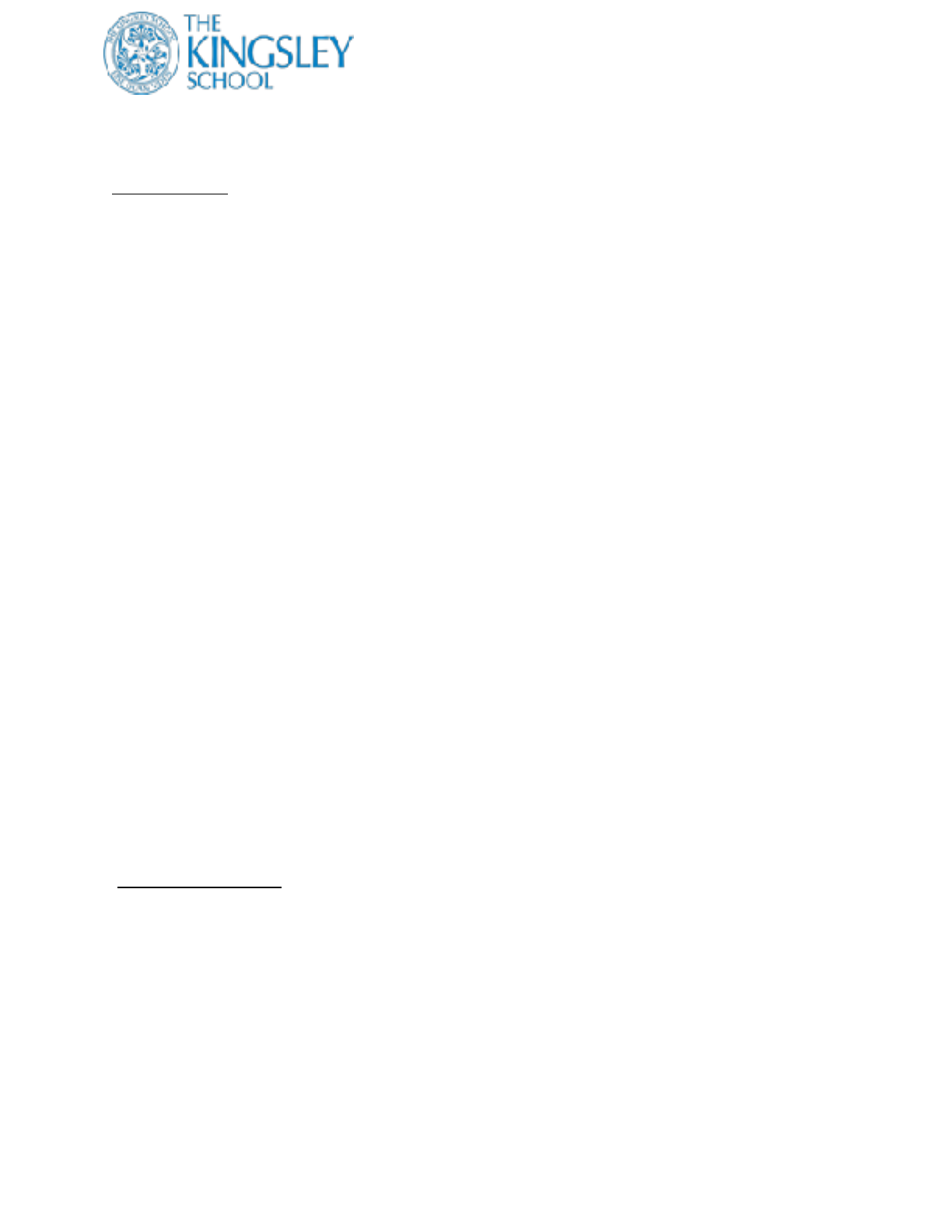
• Learning and Development
Principles into Practice
A Unique Child
At The Kingsley Prep School we recognise that every child is a competent learner who can be
resilient, capable, confident and self-assured. We know that children develop in individual
ways and at varying rates. Children’s attitudes and dispositions to learning are influenced by
feedback from others; we use praise and encouragement, as well as celebration and rewards,
to encourage children to develop a positive attitude to learning.
We give our children every opportunity to achieve their personal best and planning is adapted
to meet the needs of all groups and abilities. We do this by taking account of our children’s
range of life experiences when we are planning for their learning.
At the Foundation Stage we set realistic and challenging expectations keyed to the needs of
our children, so that most achieve the Early Learning Goals by the end of the stage. We do
this through:
• Planning opportunities that build upon and extend children’s knowledge, experience and
interests, and develop their self-esteem and confidence.
• Using a wide range of teaching strategies based on children’s learning needs.
• Providing a wide range of opportunities to motivate and support children and to help
them learn effectively.
• Offering a safe and supportive learning environment in which the contribution of all
children is valued.
• Employing resources which reflect diversity and are free from discrimination and
stereotyping.
• Promoting equality of opportunity and anti-discriminatory practice. We provide early
intervention for those children who require additional support.
• Monitoring children’s progress and taking action to provide support as necessary (such as
referrals to speech therapy) as necessary.
• Working closely with parents, carers and other outside agencies to ensure all children’s
needs are met and we enable them to access the curriculum and make good progress.
Positive Relationships
At The Kingsley Prep School we recognise that children learn to be strong, confident and
independent from being in secure relationships. We aim to develop caring, respectful,
professional relationships with the children and their families.
Parents as Partners - We recognise that parents/carers are children’s first and most enduring
educators and we value being partners with them in their child’s education through:
• Talking to parents/carers before their child starts school at our open afternoons and
induction meetings.
Updated November 2022 by J Phillips
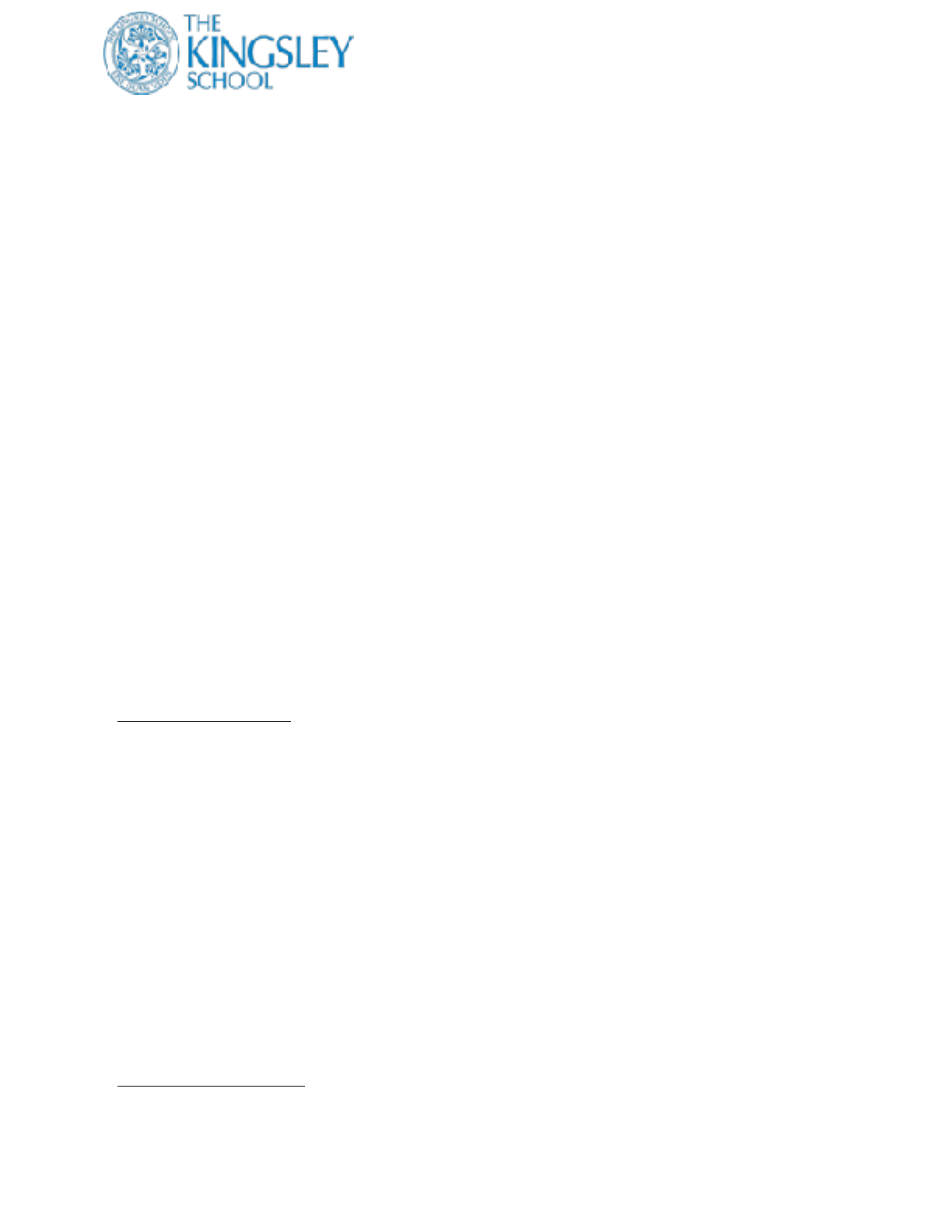
• Arranging, where possible, visits by the teacher to all children in their home setting or
childcare provision prior to their starting school.
• Providing a handbook of information about commencing Reception at The Kingsley.
• Outlining the school’s expectations in the Home-School agreement.
• Providing an induction meeting for Reception parents/carers to meet with staff to discuss
school routines, expectations and to answer any questions parents/carers may have.
• Holding an open evening early in the academic year to establish how a child is settling
into the school environment.
• Operating an open door policy for parents/carers with any queries or concerns.
Conversely, if Foundation staff have concerns about the progress of a child, they will
immediately approach parents and carers to discuss them.
• Written contact through school newsletters and email communications.
• Offering two parent/teacher consultation meetings per year at which their child’s
progress is discussed.
• Sending a written report on their child’s attainment and progress at the end of their time
in Reception.
• Asking parents to sign a generic permission form for visits, food tasting and photographs
etc.
• Parents are invited to a range of activities throughout the school year such as assemblies,
workshops, Christmas productions and sports day etc.
• Offering opportunities for parents and carers to visit the school on a volunteer basis to
assist with the children’s learning e.g. hearing readers.
Enabling Environments
At The Kingsley Prep School we recognise that the environment plays a key role in supporting
and extending the children’s development, where the children feel confident, secure and
challenged. The children have daily access to an indoor and outdoor environment that is set
up in discrete areas of learning with planned continuous provision.
Play-based learning is paramount and children have opportunities to direct their own learning
with planned opportunities provided by staff.
We plan a learning environment, both indoors and outdoors, that encourages a positive
attitude to learning and reflects the individual’s interests, passions and abilities. We use
materials and equipment that reflect both the community that the children come from and
the wider world. We encourage the children to make their own selection of the activities on
offer, as we believe that this encourages independent learning. EYFS children spend a full day
at our Forest School site each week, where they have opportunities to enhance their skills,
find practical solutions to problems and respond to physical challenge.
Learning and Developing
Updated November 2022 by J Phillips
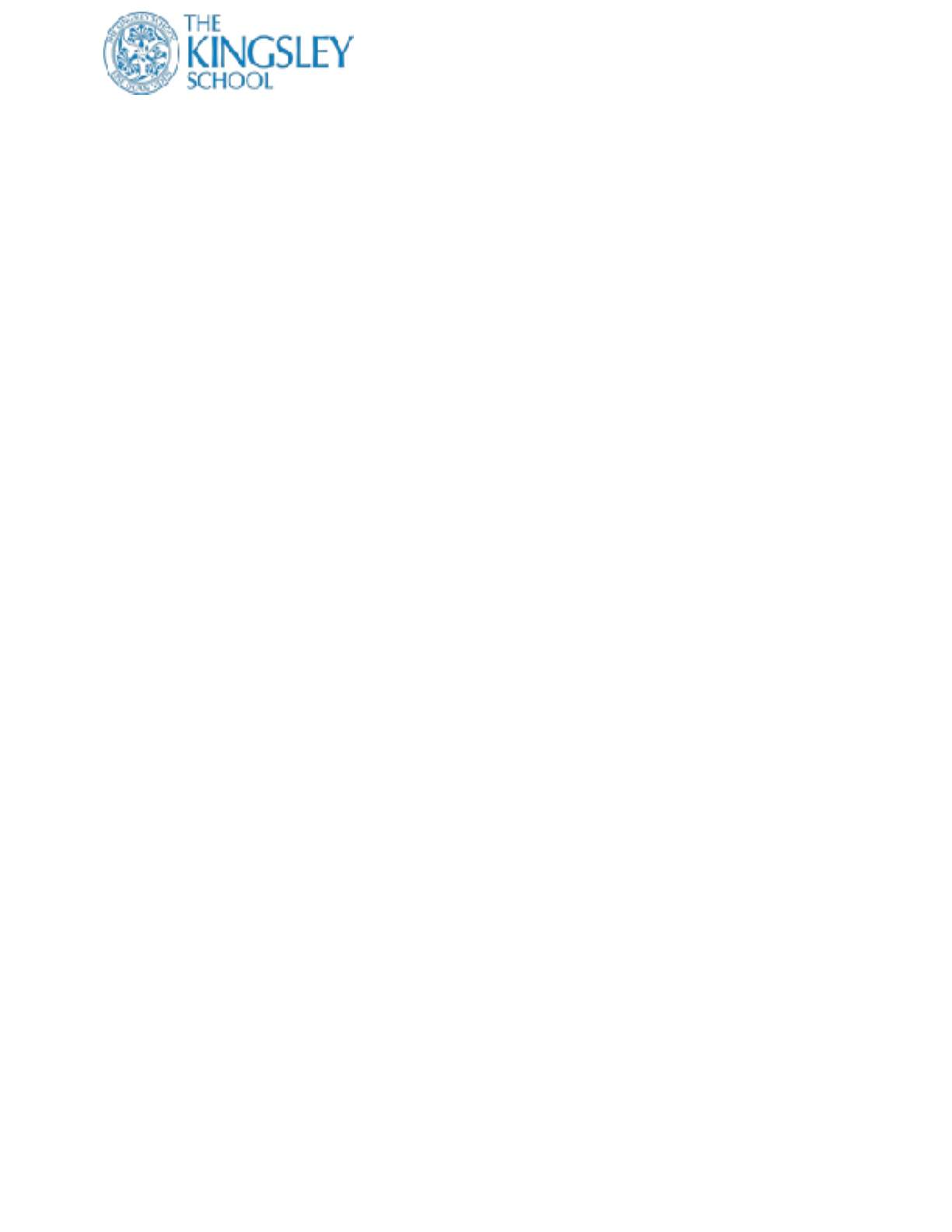
The EYFS Curriculum, our curriculum for the Foundation Stage, reflects the areas of learning
identified in the Early Learning Goals.
There are seven areas of learning and development that must shape educational provision in
any Early Years settings. All areas of learning and development are important and
interconnected. None of the areas of learning can be delivered in isolation from the others.
Our children’s learning experiences enable them to develop competency and skill across a
number of learning areas.
They require a balance of adult led and child initiated activities in order for most children to
reach the levels required at the end of EYFS. Three areas are particularly crucial for igniting
children’s curiosity and enthusiasm for learning, and for building their capacity to learn, form
relationships and thrive. The three Prime Areas are:
• Personal, Social and Emotional Development
• Communication and Language
• Physical Development
Staff will also support children in four specific areas, through which the three prime areas
are strengthened and applied.
The Specific Areas:
• Literacy
• Mathematics
• Understanding the World
• Expressive Arts and Design
Children’s development levels are assessed and as the year progresses, the balance will shift
towards a more equal focus on all areas of learning, as children grow in confidence and ability
within the three prime areas. However, if a child’s progress in any of the prime areas gives
cause for concern, staff will discuss this with the child’s parents/carers and agree how to
support the child. Reception pupils also participate in a daily phonics sessions, following the
programme of “Jolly Phonics” and in line with school policy.
Characteristics of Effective Learning
At The Kingsley we ensure that our environment and delivery of the curriculum incorporates
the three characteristics of effective teaching and learning:
Playing and Exploring - children will have opportunities to investigate and experience things,
and “have a go.”
“Children’s play reflects their wide ranging and varied interests and preoccupations. In their
play children learn at their highest level. Play with peers is important for children’s
development.” Early Years Foundation Stage Profile
Through play, our children explore and develop learning experiences, which help them make
sense of the world. They practise and build up ideas, learn how to control themselves and
understand the need for rules. They have the opportunity to think creatively alongside other
Updated November 2022 by J Phillips
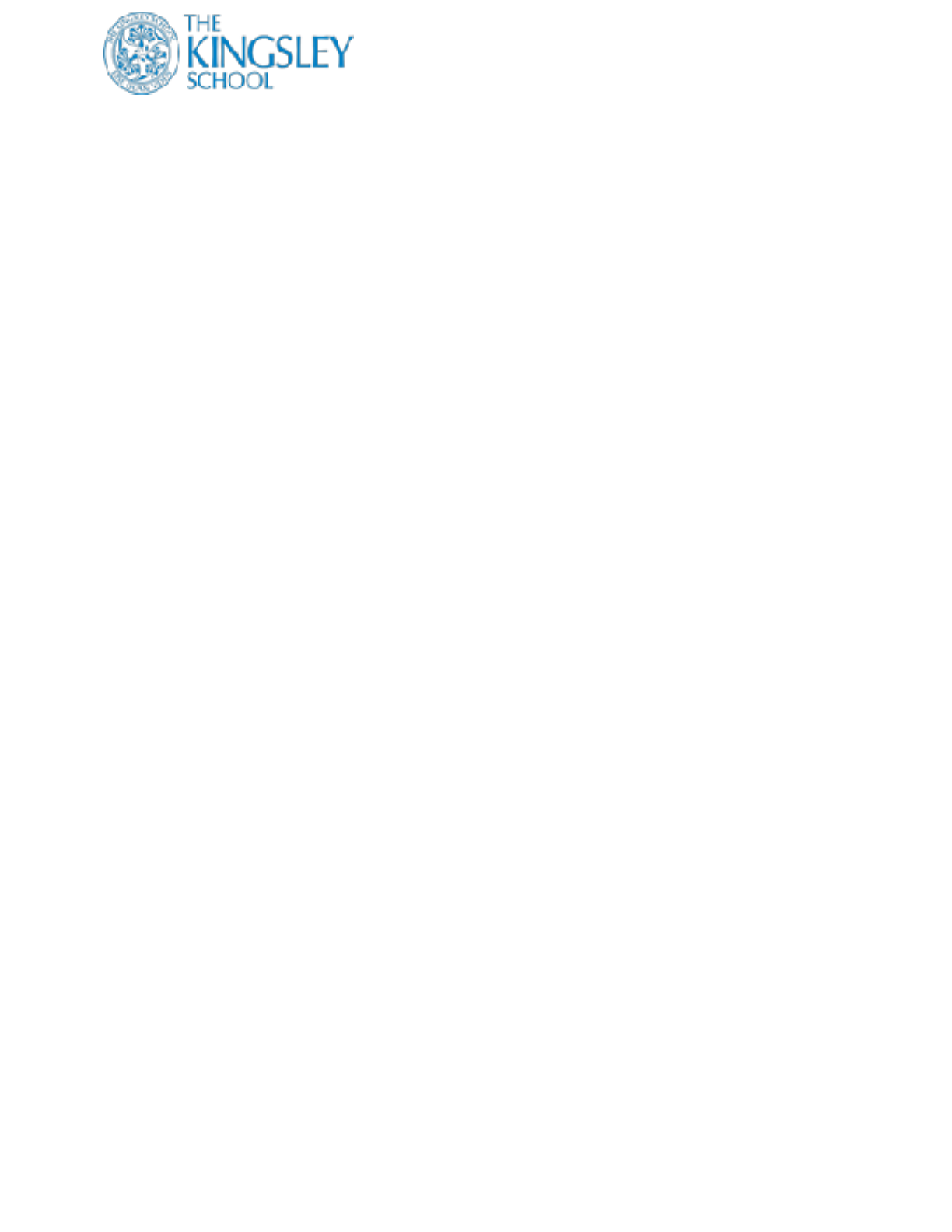
children as well as on their own. They communicate with others as they investigate and solve
problems.
Active Learning - children will have time and space to concentrate and keep on trying if they
encounter difficulties, and enjoy their achievements. “Children learn best through physical
and mental challenges. Active learning involves other people, objects, ideas and events that
engage and involve children for sustained periods.” Early Years Foundation Stage Profile
Active learning occurs when children are motivated and interested. Children need some
independence and control over their learning. As children develop their confidence, they
learn to make decisions. It provides children with a sense of satisfaction as they take
ownership of their learning.
Creating and Thinking Critically - we encourage and support children to have and develop
their own ideas; make links between ideas, and develop strategies for doing things.
“When children have opportunities to play with ideas in different situations and with a
variety of resources, they discover connections and come to new and better understandings
and ways of doing things. Adult support in this process enhances their ability to think
critically and ask questions.” Early Years Foundation Stage Profile.
Children should be given the opportunity to be creative through all areas of learning. Adults
can support children’s thinking and help them make connections by showing interest, offering
encouragement, clarifying ideas and asking open ended questions. Children can access
resources and move around the classroom freely and purposefully to extend their learning.
Strategies and Learning Styles
We ensure there is a balance of adult led and child initiated activities across the day.
Although much of the time is spent with children self-selecting tasks, the interaction between
the adult and child is essential as the adult’s response to children builds understanding and
therefore guides new learning. The adult’s role is to continually model, demonstrate and
question what the child is doing. In some cases the adult will ask a child to come and
complete a task or game with them; at other times they will participate in a child’s game,
extending it where possible.
Observation and Assessment
As part of our daily practice we observe and assess children’s development and learning to
inform our future plans. We record our observations in a variety of ways. Everyone is
encouraged to contribute and discussions take place. We use Tapestry to collect evidence of
children’s knowledge and understanding and progress is tracked, and next steps identified
within individualised planning documentation and the Development Matters Pupil Profiles. In
the final term of the Foundation Stage, we provide the parents with a report based on their
child's development against each of the Early Learning Goals and the characteristics of their
learning. The parents are then given the opportunity to discuss these judgements with the
teacher in preparation for Year 1.
Transition
Updated November 2022 by J Phillips
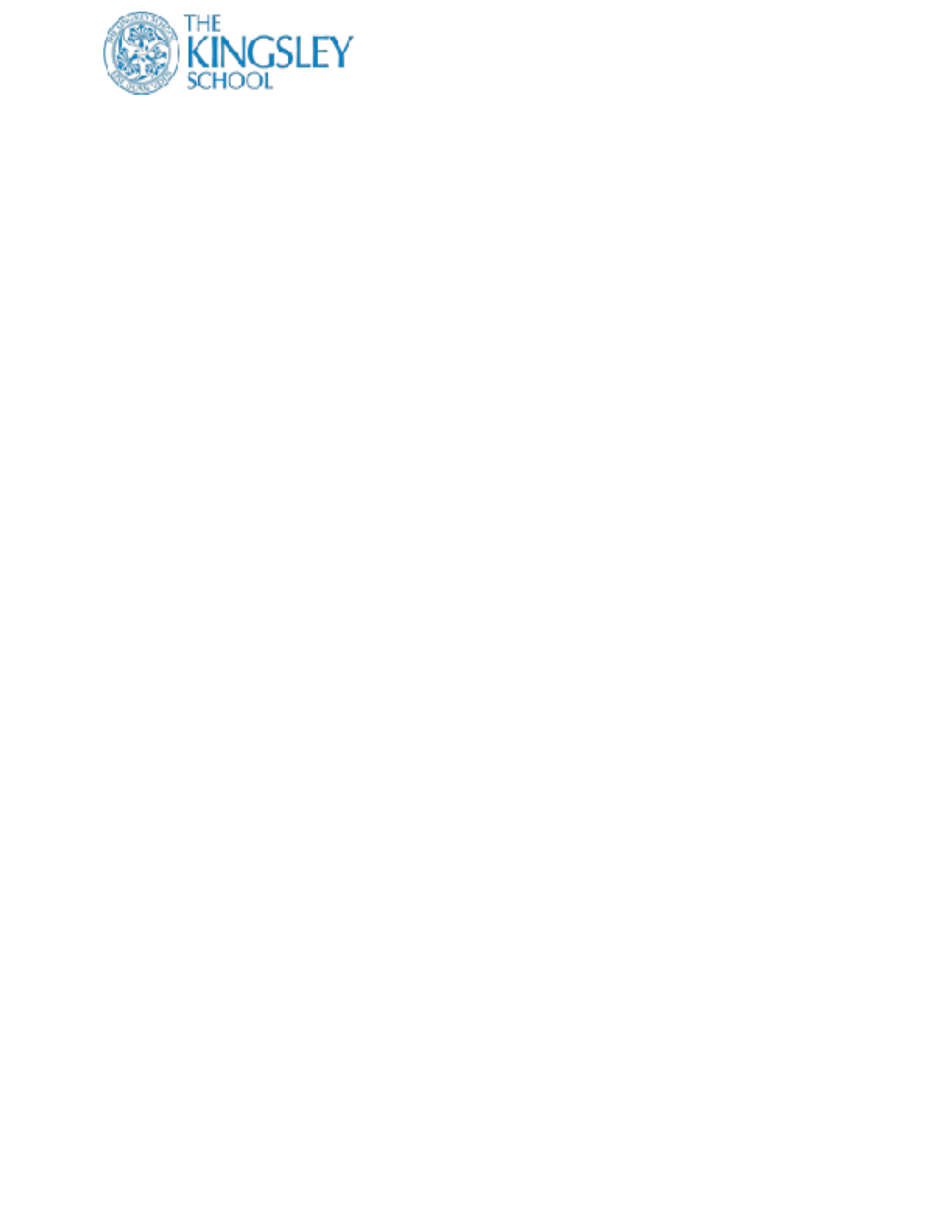
Starting school can be a difficult time for young children; we therefore plan this time
carefully to support children with the transition and to ensure it is as smooth as possible for
each child and that they settle in to their new class quickly and happily.
Starting Reception – Parents of all children starting in the next academic year will be invited
to an Induction Meeting in the summer term to meet their child’s new teacher and other key
staff and learn more about the Reception curriculum.
Were possible arrangements are made for the children’s new class teacher to visit them in
their current nursery setting if they have not previously attended The Kingsley Nursery.
Inclusion
We value all our children as individuals at The Kingsley Prep irrespective of their ethnicity,
culture, religion, home language, background, ability or gender. We plan a curriculum that
meet the needs of the individual child and support them at their own pace so that all of our
children will achieve their potential. We strongly believe that early identification of children
with additional needs is crucial in enabling us to give the child the support that they need and
in doing so, work closely with parents and outside agencies. See our separate policy on
Inclusion.
Safeguarding
“Children learn best when they are healthy, safe and secure, when their individual needs are
met, and when they have positive relationships with the adults caring for them.” (Statutory
Framework for EYFS 2014)
At The Kingsley Prep School, we understand that we are legally required to comply with
welfare requirements as stated in the Statutory Framework for Early Years Foundation Stage
2014. These are:
• To provide a setting that is welcoming, safe and stimulating where children can grow in
confidence.
• Promote good health.
• Manage behaviour effectively in a manner appropriate for the children’s stage of
development and individual needs.
• To e n s u r e t h a t a l l a d u l t s w h o l o o k a f t e r t h e c h i l d r e n , o r w h o h a v e u n s u p e r v i s e d a c c e s s t o
them, are suitable to do so.
• Ensure that the setting, furniture and equipment is safe and suitable for the purpose for
which it was intended.
• Maintain records, policies and procedures required for the safe efficient management of
the setting and to meet the needs of the children.
Keeping Safe
It is important to us that all children in the school are “safe.” We aim to educate children on
boundaries, rules and limits and to help them understand why they exist. We provide children
with choices to help them develop this important life skill. We encourage children to take
risks and highlight the importance of keeping themselves safe by teaching them how to
Updated November 2022 by J Phillips
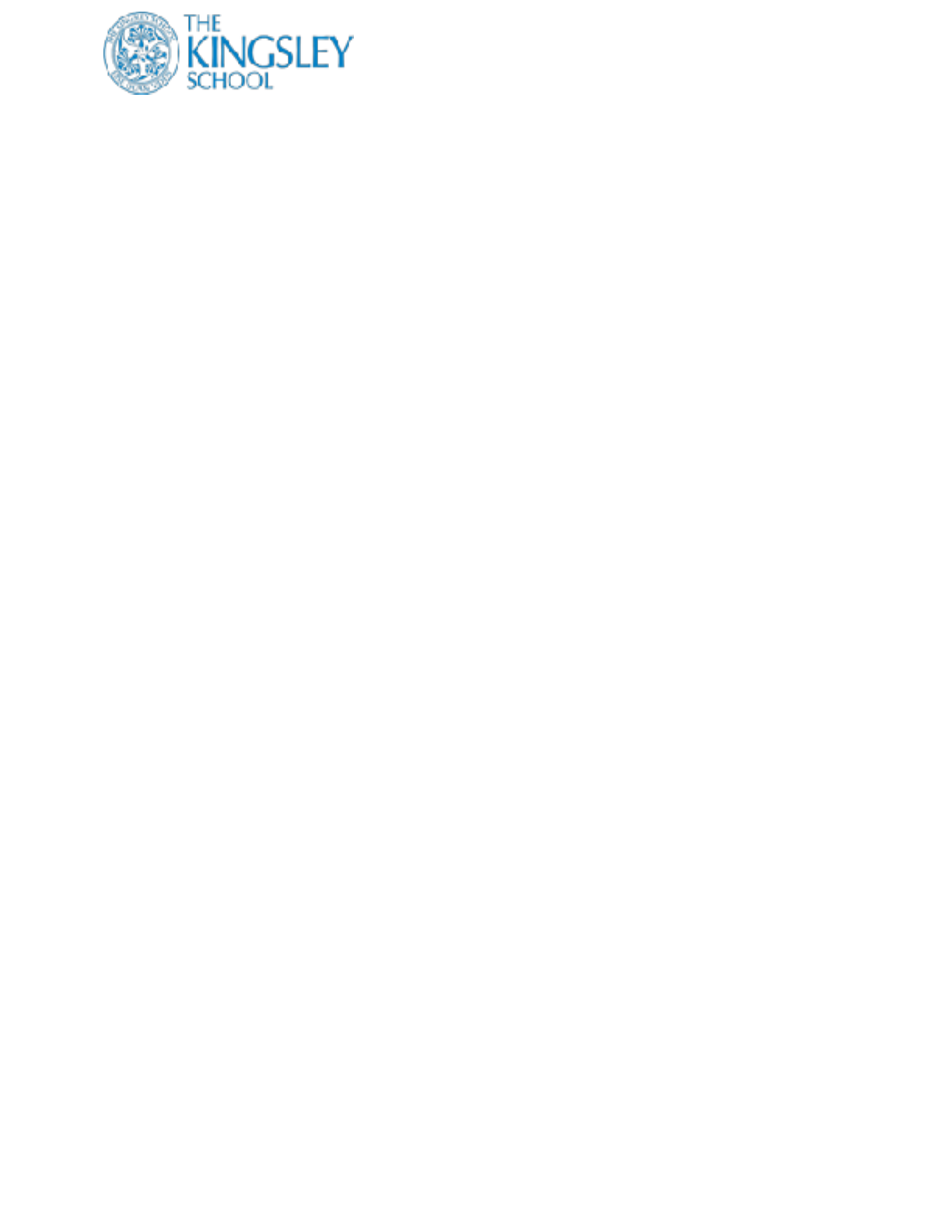
recognise and avoid hazards. We aim to protect the physical and psychological well-being of
all children. (See The Kingsley’s Safeguarding Children Policy.) All staff are aware of the
Safeguarding and Child Protection procedures and will report the disclosure to the DSL
immediately.
Reporting Accidents and Incidents
At Kingsley, the safety and well-being of the children is our priority. Staff follow strict
procedures and guidelines in order to minimise any risk to children. However, some accidents
are unavoidable.
Full details of how accidents are reported in the EYFS can be found in the EYFS Accident and
Incident Policy.
Mobile Phone Policy
Mobile phone use is covered in staff training during the induction process and policies are
reviewed regularly in the light of changing technologies.
•
Personal mobile phones should be either turned off or on silent and not accessed
during working hours.
•
Staff working in the EYFS should hand in their phones to the school office
•
Mobile phones can only be used on a designated break and this must be away from the
children.
•
During trips staff can only use mobile phones or iPads belonging to the school.
•
Photographs must not be taken of the children on any personal phones or any other
personal information storage device. Only nursery-owned devices can be used to take
photographs or videos.
•
Staff must not use personal mobile phones to communicate with parents/carers or give
out their personal mobile numbers or email addresses.
•
Staff who bring personal mobile phones into the school building must ensure that there
is no inappropriate or illegal content on them.
•
All members of staff should remain vigilant and report any concerns to the setting’s
manager or designated safeguarding lead (DSL). Parents and staff should be informed
of the complaints procedure and staff made aware of the whistleblowing procedure.
•
If a member of staff breaches the mobile phone policy, action will be taken in line
with the staff code of conduct and allegations policy.
If a member of staff is thought to have illegal content on a mobile phone or have committed a
criminal offence using a personal device or mobile phone, the police will be contacted and
the LADO (Local Authority Designated Officer) will be informed.
Updated November 2022 by J Phillips
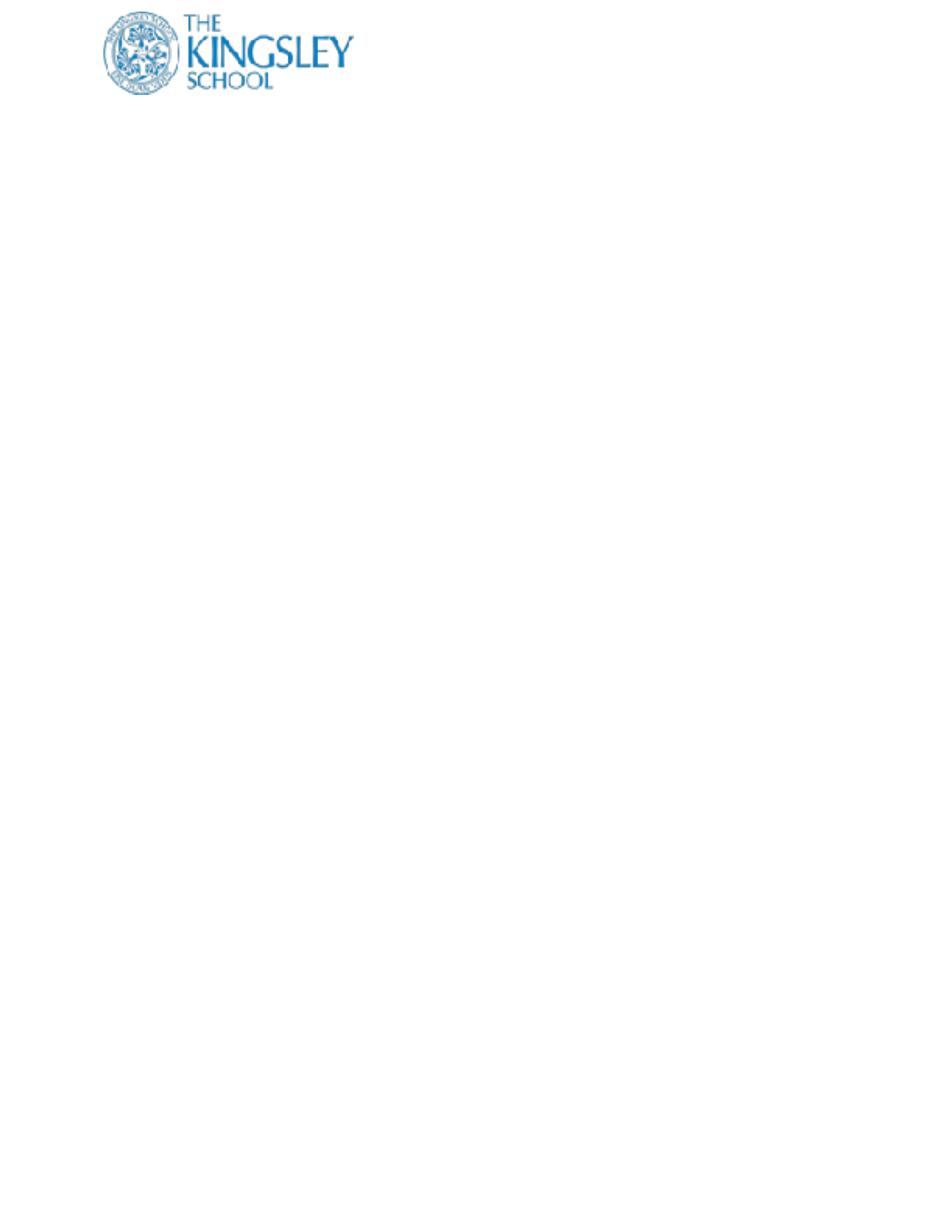
Confidentiality: Staff are unable to offer absolute confidentiality. We will reassure
children that staff will act in their best interests and that this may involve sharing
information if the child is at risk of harm.
Monitoring and Review
• Monitoring will take place in line with school monitoring procedures.
• Data is regularly collected and shared with the governors
•
This policy will be reviewed every year
Updated November 2022 by J Phillips
